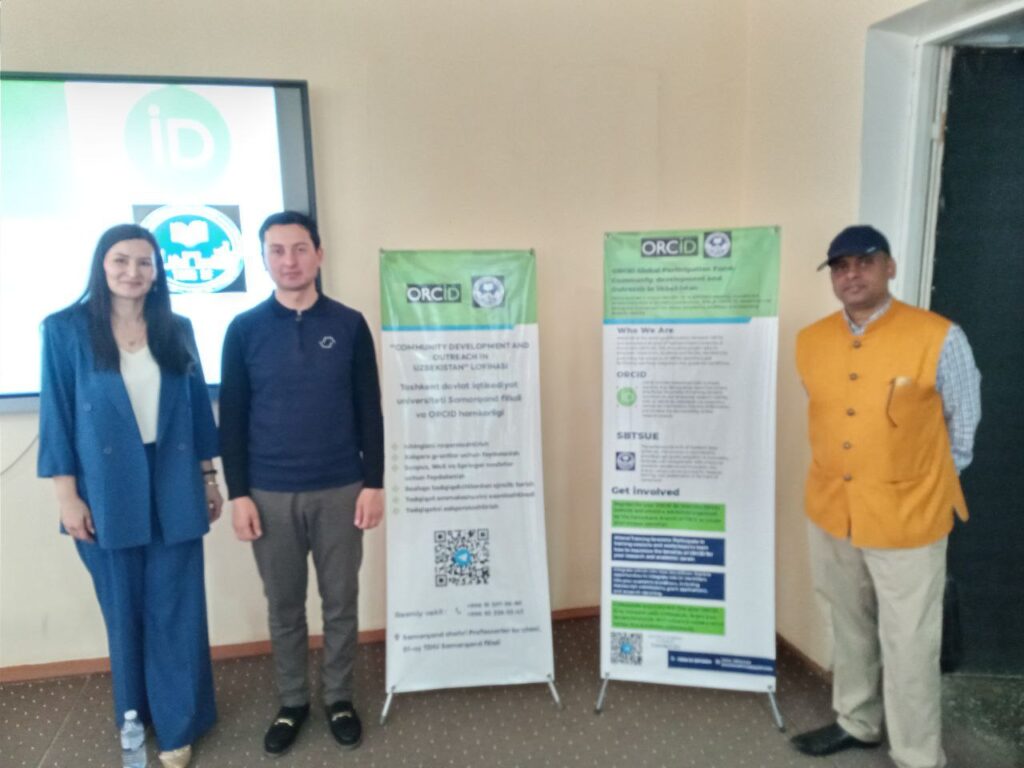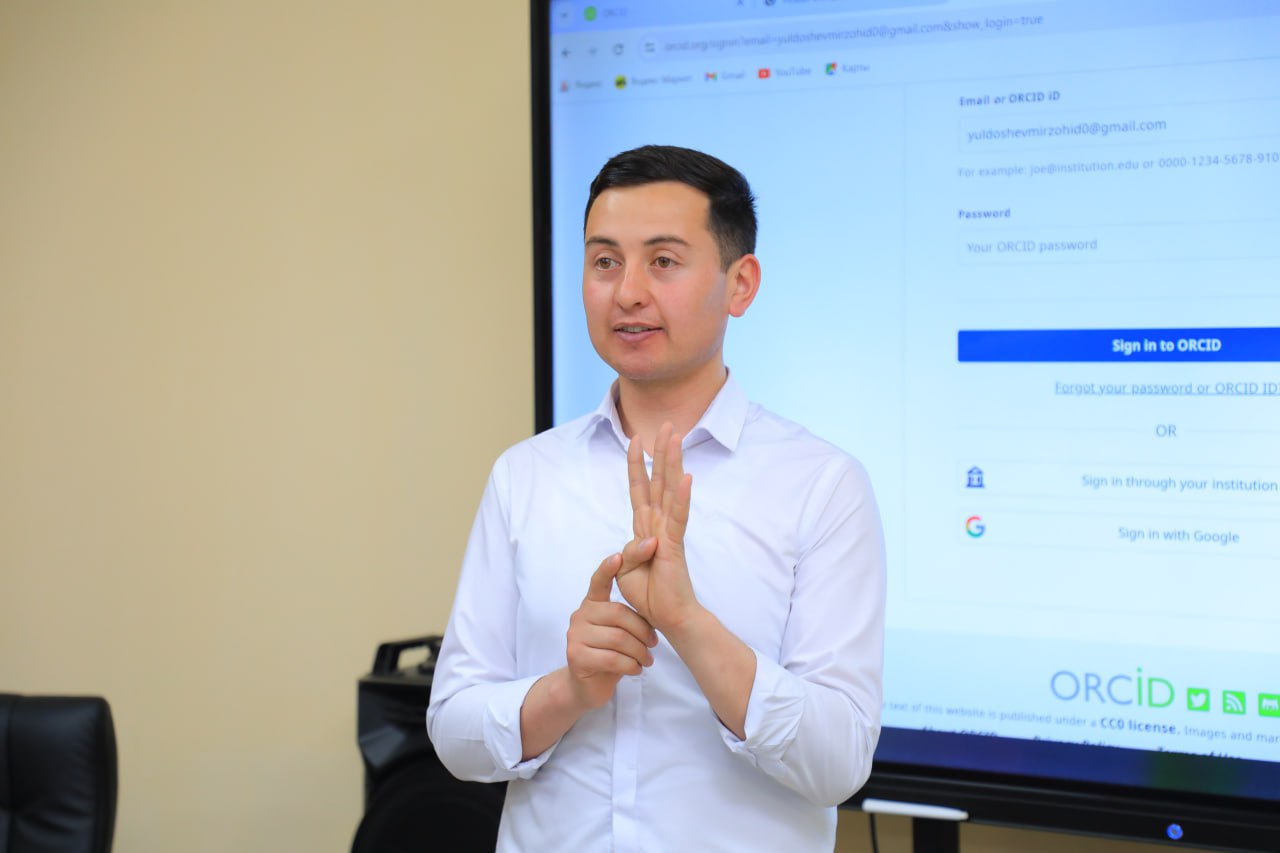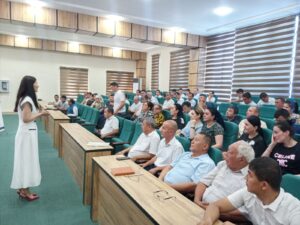ORCID is pleased to highlight another remarkable success story from our Global Participation Fund (GPF) program, which is designed to increase ORCID adoption and foster ORCID Communities of Practice in countries with low- and lower-middle-income economies as defined by the World Bank.
The Samarkand Branch of Tashkent State University of Economics (SBTSUE) in Uzbekistan received a GPF grant in Round 3, and, despite facing significant hurdles, has achieved results that have elevated research in the country to the global stage. Their project not only met its stated goals, but it also exceeded expectations while demonstrating the power of perseverance, strategic networking, and persistent identifiers in an emerging research ecosystem.

A bold vision for Uzbekistan’s academic community
The ORCID Outreach and Community Development project, launched in February 2024, set out to introduce ORCID to Uzbekistan’s higher education sector. The project aimed to enhance research visibility and collaboration by encouraging researchers to register for and use ORCID iDs. With a grant of $16,000, the team’s initial goal was to onboard 1,250 researchers.
Leveraging adaptability and innovation from the start
In spite of regulatory requirements that delayed initial disbursal of project funds, the team, led by Principal Investigator Dr. Praveen Malla and Vice-Rector Dr. Zafar Abdullayev, quickly adapted by shifting strategy, reallocating budgets, and even leveraging personal funds to keep the project on track.
They purchased laptops to enable virtual seminars, dramatically expanding their reach to universities across the country without the logistical and financial costs of in-person travel.
The project also tackled a technical hurdle head-on. When researchers couldn’t find SBTSUE listed in the ORCID registration interface, the team registered the university with the Research Organization Registry (ROR). This simple but critical step ensured accurate affiliation representation and streamlined the onboarding process for their colleagues.
“The willingness to adapt and leverage personal networks was crucial. A single phone call could bypass bureaucracy and result in a well-attended ORCID seminar,” explained Dr. Malla.

Exceeding expectations
Despite facing these obstacles, the project still managed to make an enormous impact in Uzbekistan, elevating the country’s research globally.
“This project has not only achieved its objectives but set a precedent for future initiatives, proving that impactful change is possible even under challenging circumstances,” said Dr. Malla.
Some of the impressive outcomes from the grant include:
- Engaged 75% of Uzbekistan’s Higher Education Institutions: This included 51% of foreign universities, 75% of private universities, and 77% of state universities, creating a robust, nationwide network of ORCID ambassadors.
- Onboarded Over 9,000 Researchers: This result surpassed the initial goal of 1,250 by eight times, demonstrating a massive appetite for persistent identifiers within the academic community.
- Institutionalized ORCID iDs: SBTSUE now mandates ORCID iDs for conference submissions, a practice that other universities are beginning to adopt, embedding ORCID into the academic workflow.
- Gained Government Recognition: The project’s success captured the attention of the Uzbek government, which is now considering a consortia membership for state universities.
- Challenged Regional Biases: By being based in Samarkand rather than the capital, Tashkent, the project proved that impactful initiatives can thrive outside traditional hubs, setting a precedent for decentralized project execution.
A Lasting Legacy
While the funded work is complete, the journey continues. The project has laid a strong foundation for future growth, with plans to organize ORCID-sponsored scientific conferences and workshops to further embed ORCID into Uzbekistan’s academic culture.
The team believes that sustained funding and continued government backing will be critical to ensuring the long-term impact of their efforts. Their work serves as a powerful case study for how ORCID’s Global Participation Fund can catalyze significant, lasting change in emerging research ecosystems, even in the face of daunting challenges.
“The project has successfully transformed Uzbekistan’s academic landscape, enabling a culture of research transparency and collaboration,” said Dr. Malla. “The project demonstrated that impactful initiatives can thrive outside of traditional hubs, challenging regional biases and decentralizing success. The journey has just begun and the path ahead is filled with immense potential for further success.”

Learn more about the Global Participation Fund and visit our GPF Outcomes page. The GPF awards two rounds of grants each year. Stay tuned for our next call for proposals in October!
